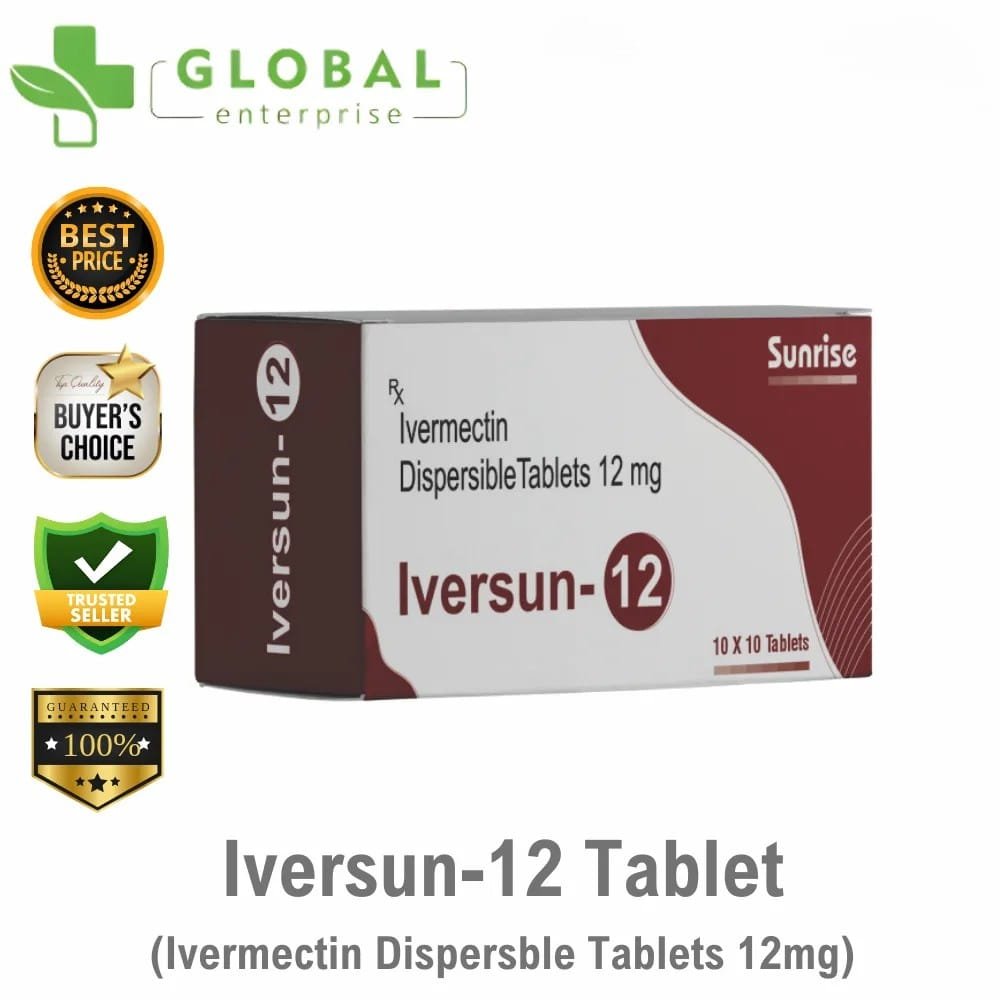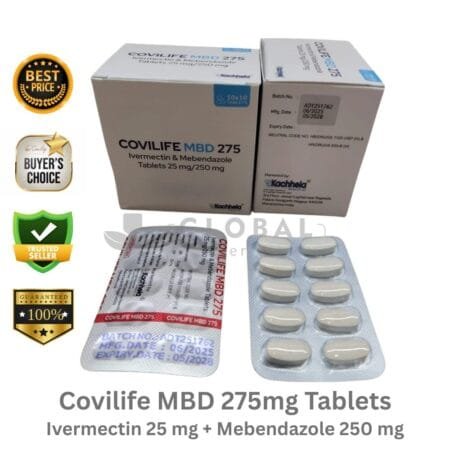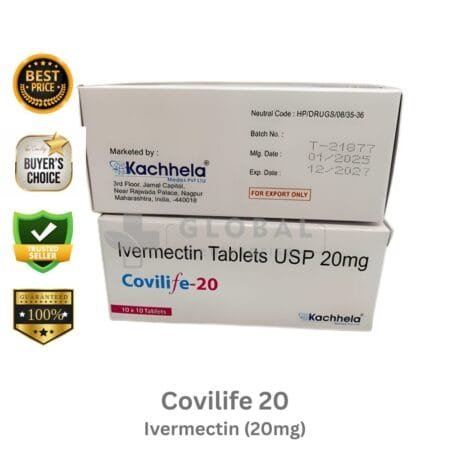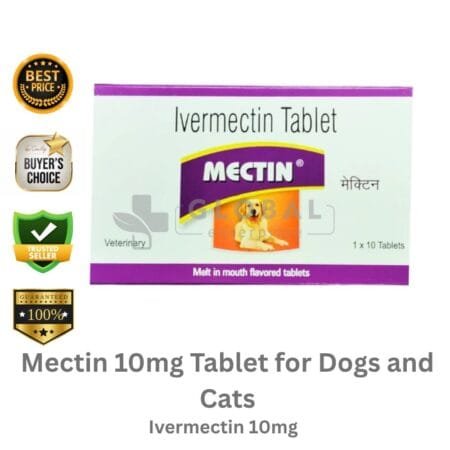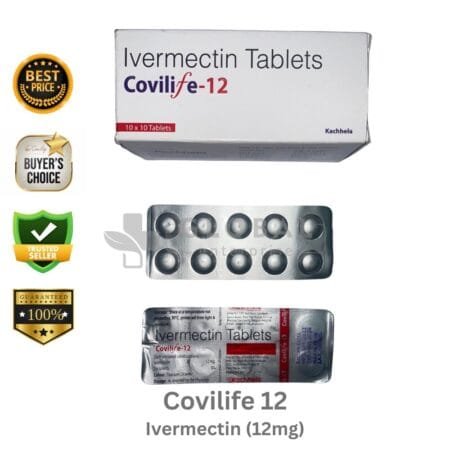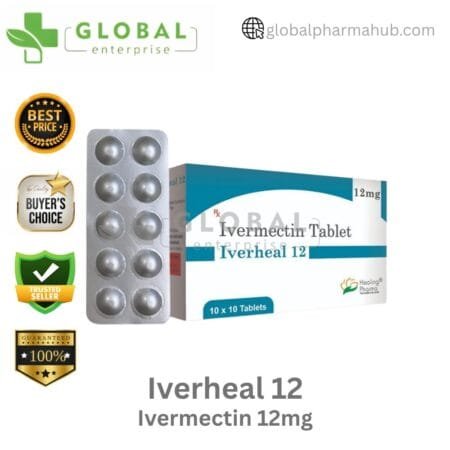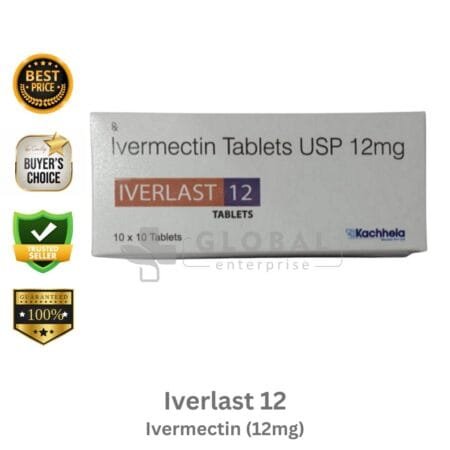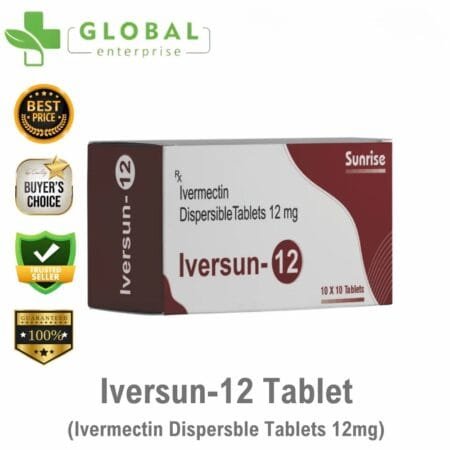Description
What is Iversun (Ivermectin Tablets) ?
Ivermectin is an FDA-approved antiparasitic medication used to treat various parasitic infections in humans, including parasitic worms, hookworm, and whipworm. It is also effective in managing conditions such as onchocerciasis (river blindness) and intestinal strongyloidiasis. Additionally, ivermectin has shown potential in treating a broad range of other medical conditions.
How Does Iversun Work?
Iversun is an anti-parasite drug used to treat parasitic infections. It acts by targeting against particular parasitic channels. Invertebrate muscle and nerve cells’ glutamate-gated chloride ion channels are where the medication binds. This binding causes hyperpolarization by increasing the permeability of cell membranes to chloride ions. The parasite dies as a result of becoming paralyzed.
GABA, a neurotransmitter, is also impacted. It disrupts the GABA-mediated transmission of parasites across the central nervous system by acting as an agonist. Because of its dual action, ivermectin is very effective against a variety of parasite illnesses.
The medication also works to stop female worms from releasing microfilariae, which stops parasites from spreading. Ivermectin can treat a variety of parasite illnesses with a single dose thanks to its special mode of action.
Who Can Use It?
- Adults
- Paediatrics
When to Take It?
- Take ivermectin tablets on an empty stomach with a full glass of water for best absorption.
Key Benefits
- Ivermectin treats various parasitic outbreaks, such as roundworm, whipworm, and filariasis.
- It is the recommended treatment for onchocerciasis, also referred to as river blindness
- It is especially effective against intestinal strongyloidiasis, a condition caused by Strongyloides stercoralis.
- It is also effective against scabies, head lice, and tropical eosinophilia; and its broad-spectrum antiparasitic activity makes it useful in treating mite infestations.
Dosage & Usage Instructions
How to take (with/without food, best time).
- Take Iversun either at least one hour before a meal or at least two hours after a meal. It should be taken on an empty stomach.
Recommended dosage per condition
- As directed by the physician
- The dosage of ivermectin tablets depends on the condition being treated and the patient’s body weight.
- Ivermectin tablets are available in a strength of 3 mg, 6mg and 12mg . The prescribed number of tablets depends on the patient’s weight.
Recommended Adult Dose for Onchocerciasis
- The usual dose is a single 150 mcg/kg, but additional doses may be needed.
For patients with severe eye infections, retreatment may be required every 6 months, or in some cases, as soon as 3 months.
Recommended Adult Dose for Strongyloidiasis
- The usual ivermectin dose for strongyloidiasis is about 200 mcg per kg of body weight, taken as a single oral dose. In most cases, additional doses aren’t needed.
- However, in immunocompromised patients, including those with HIV, the infection may be harder to treat. They may need repeated doses every two weeks or ongoing monthly treatment. A complete cure might not always be possible in these patients.
Recommended Adult Dose for Ascariasis
- 0.2 mg/kg orally once
Recommended Adult Dose for Filariasis
- mg/kg orally once
Follow your doctor’s instructions precisely, and do not change the dose without medical advice. A single dose is usually enough for most parasitic infections. In some cases, especially for those with weakened immune systems, repeat doses may be needed after several months or up to a year.
Overdose & missed dose information
- Do not take more ivermectin than your doctor recommends, as it may cause harmful effects.
Side Effects & Precautions
Common side effects (e.g., headache, dizziness)
- Headache
- Dizziness
- Nausea
- Swollen lymph nodes
- Joint Pain
- Itching
- Rash
- Diarrhoea
- Chest discomfort
- Fever
- Orthostatic hypotension
- Eye problems, such as eye swelling, pain, and redness
Serious side effects (e.g., heart issues – consult a doctor).
- Neck or back pain
- Confusion
- Severe allergic reactions manifest as trouble breathing or swelling of the throat
- In extreme cases, ivermectin can cause liver damage, resulting in tiredness, nausea, and yellowing of the skin or eyes.
- Precautions for heart patients, kidney patients, etc.
Repeat doses may be needed for individuals with weakened immunity, such as those with HIV/AIDS. Always follow your doctor’s instructions on dosage and timing, and never take ivermectin without medical advice.
Pregnancy and Lactation:
- Pregnant women should use ivermectin only if absolutely necessary. Breastfeeding mothers should consult their doctor before taking it.
Dizziness Precaution:
- Ivermectin may cause dizziness. Avoid driving or operating machinery until you know how it affects you.
Drug Interactions
- Medicines to avoid (e.g., Nitrates, alcohol)
- Alcohol
- Antibiotics
- Aspirin
- Barbiturates like phenobarbital and butalbital
- Blood thinners
- Valproic acid
- Food interactions (e.g., avoid grapefruit juice).
- Orange juice
- Avoid Caffeine
Storage & Safety Information
- Store Iversun tablets at room temperature, away from heat, moisture, and direct light.
- Keep the medication out of reach of children.
FAQ’S
What is Ivermectin? What is it used for?
Ivermectin belongs to a class of highly-active broad-spectrum antiparasitic agents. It helps to treat many types of parasite infections, including head lice, scabies, river blindness (onchocerciasis), certain types of diarrhea (strongyloidiasis) and some other worm infections. It can be taken orally or topically.
How does Ivermectin work?
Ivermectin works by paralyzing and then killing the harmful organisms causing the infection. It also slows their growth, helping the body heal faster and effectively treating the infection.
Is ivermectin effective?
Yes, Ivermectin works well against parasitic infections. Some studies also suggest it may have other benefits.
What if I forget to take a dose of ivermectin?
If you forget to take a dose, take it as soon as you remember. But if it’s almost time for your next dose, skip the missed one and take your next dose as usual.
Is ivermectin safe?
Ivermectin tablets are usually safe when taken as directed. But like any medicine, they may cause side effects.
Can I take ivermectin every day?
Ivermectin is not usually taken every day. The dose and how often you take it depend on your condition and symptoms. Always follow your doctor’s instructions.
What to avoid when taking ivermectin?
Avoid alcohol while using ivermectin, as it may worsen side effects. Also, let your doctor know about any other medications you’re taking, as ivermectin may interact with them.
How long until ivermectin starts to work?
The time it takes for ivermectin to work varies and depends on the condition. For parasitic infections, it may take several days to see improvement.
How long after ivermectin can I eat?
It is best to take ivermectin on an empty stomach. Wait at least 30 minutes after taking the medication before eating or drinking anything
Is Ivermectin available over the counter?
No, Ivermectin is not available over the counter. It can only be taken if prescribed by a doctor. Do not self-medicate to avoid any side effects. Take it only under the supervision of a healthcare professional to get the maximum benefit of Ivermectin.

